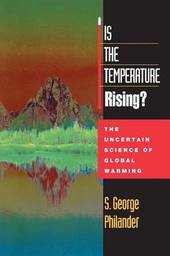
|
Is the Temperature Rising?: The Uncertain Science of Global Warming
Paperback / softback
Main Details
| Title |
Is the Temperature Rising?: The Uncertain Science of Global Warming
|
| Authors and Contributors |
By (author) S. George Philander
|
| Physical Properties |
| Format:Paperback / softback | | Pages:240 | | Dimensions(mm): Height 229,Width 152 |
|
| Category/Genre | Popular science
Meteorology and climatology
Global warming |
|---|
| ISBN/Barcode |
9780691050348
|
| Classifications | Dewey:551.5253 |
|---|
| Audience | | Professional & Vocational | | Tertiary Education (US: College) | |
|---|
| Illustrations |
85 line illus
|
|
Publishing Details |
| Publisher |
Princeton University Press
|
| Imprint |
Princeton University Press
|
| Publication Date |
5 March 2000 |
| Publication Country |
United States
|
Description
Most of us have heard about the dire predictions about global warming. Some experts insist that warming has already started, and they warn of such impending disasters as the sea level rising to flood coastal cities. Others, however, have issued loud counterclaims assuring us that global warming is a myth based on misleading data. How can we tell who is right, and how should we respond? And why is there no scientific consensus on a matter of such vital importance? George Philander addresses these questions in this book, as he guides the nonscientific reader through new ideas about the remarkable and intricate factors that determine the world's climate. In nontechnical language, Philander describes how the interplay between familiar phenomena - winds and clouds, light and air, land and sea - maintains climates that permit a diversity of fauna and flora to flourish on Earth. That interplay also creates such potent weather disrupters as El Nino and La Nina, translates modest fluctuations in sunlight into global climate changes as dramatic as the Ice Age, and determines the Earth's response to the gases we are discharging into the atmosphere, such as those that led to the ozone hole over Antarctica, and those that are likely to cause global warming. In his discussion of these matters, Philander emphasizes that our planet is so complex that the scientific results will always have uncertainties. To continue to defer action on environmental problems, on the grounds that more accurate scientific results will soon be available, could lead to a crisis. To make wise decisions, it will help if the public is familiar with the geosciences, which explore the processes that make ours a habitable planet. This book is an introduction to the basics of the Earth's climate and weather, a contribution to the debate about climate change and the relationship between scientific knowledge and public affairs.
Author Biography
S. George Philander is Professor of Geosciences at Princeton University. He is the author of El Nino, La Nina, and the Southern Oscillation.
Reviews"S. George Philander ... writes with skill and cool reserve. Is the Temperature Rising? ... is a careful, step-by-step look at confusing data and clarifying science. He is literate, quoting Shelley, Coleridge, and Eliot. And he is reasonably sure we are digging our own grave, though he says so with such understatement that it is easy to overlook the doom and gloom."--William J. Broad, The New York Times Book Review "[The author] guides us through this learning experience with grace, wit, and clarity... Dr. Philander has tried to help us gain ... appreciation [for how significantly human activity is changing atmospheric chemistry] ... and he succeeds."--Robert C. Cowen, Christian Science Monitor "The author explains complex scientific concepts in a precise language and with delightful illustrations... The book is a pleasure to read."--Hans von Storch, Nature "In Is the Temperature Rising?, S. George Philander examines the question historically, meteorologically, chemically and every other way. At the end of the well-written survey, you will know every detail of the subject..."--New Scientist "Ought to be required reading for every eco-preacher."--John Emsley, Times Literary Supplement "A book that can be easily understood by policymakers and scientists, but yet does not sacrifice any detail in background and process is most welcome. Philander may be the first author to write such a comprehensive book ... Indeed, the author deserves immense credit for such a skillful presentation."--Geerat J. Vermeij, The Quarterly Review of Biology
|